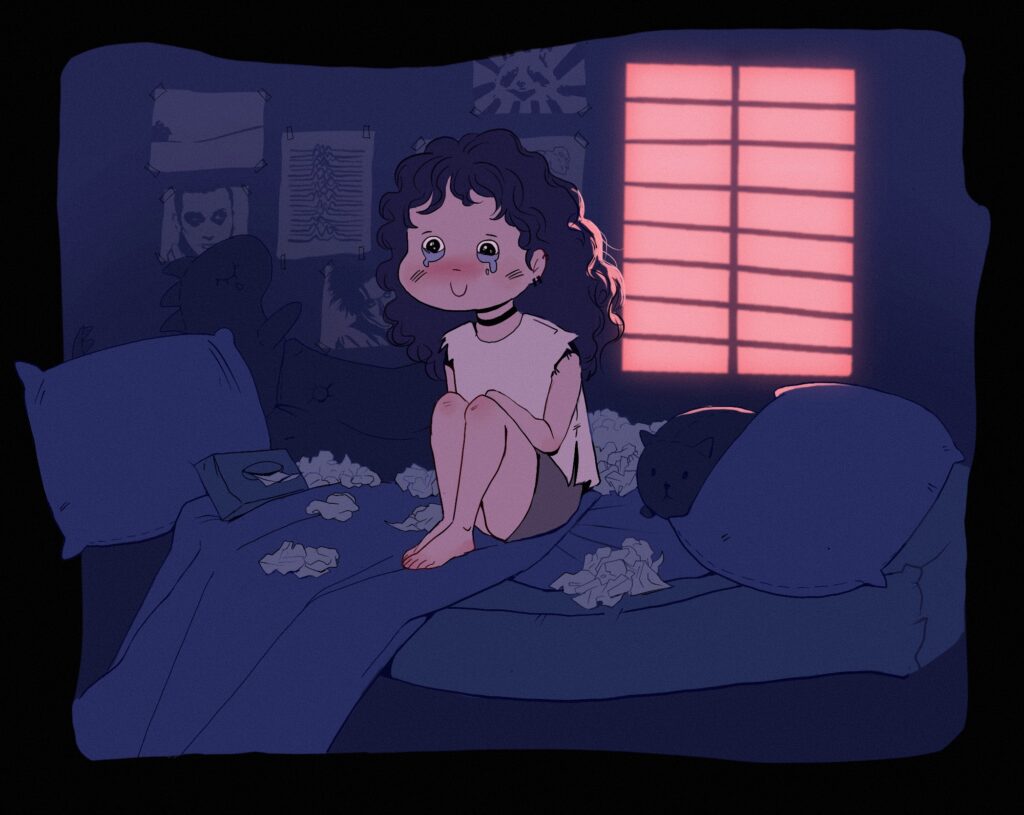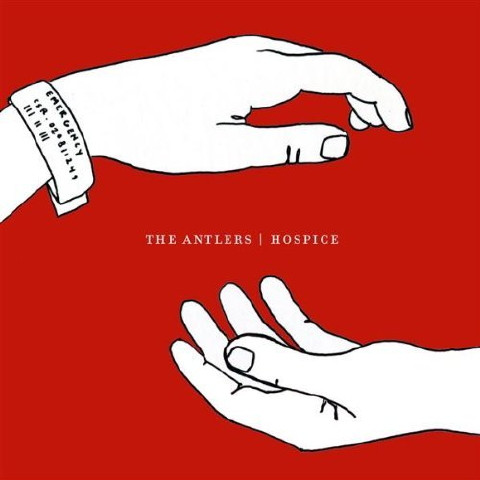“Lyric poems, even when based on narratives, do not resemble stories. All stories are about battles, of one kind or another, which end in victory or defeat. Poems, regardless of any outcome, cross the battlefields, tending the wounded.” (1)
– John Berger

Index
Introduction
Poem
Story
Analysis
Introduction
Developed and illustrated during the courses “erzähle (dich selbst) mit Code” and “the crying institute” this project seeks to visually explore a favorite poem of mine which made me cry the first time I read it: “Scheherazade”(2) by Richard Siken. The illustrations are inspired by me and my friends’ interpretations of the poem, our shared experiences, and our nightmares.
– CHECK OUT THE WEBSITE HERE –
Poem
Tell me about the dream where we pull the bodies out of the lake
and dress them in warm clothes again.
How it was late, and no one could sleep, the horses running
until they forget that they are horses.
It’s not like a tree where the roots have to end somewhere,
it’s more like a song on a policeman’s radio,
how we rolled up the carpet so we could dance, and the days
were bright red, and every time we kissed there was another apple
to slice into pieces.
Look at the light through the windowpane. That means it’s noon, that means
we’re inconsolable.
Tell me how all this, and love too, will ruin us.
These, our bodies, possessed by light.
Tell me we’ll never get used to it.
Story
Written by Richard Siken, Scheherazade is named after the main protagonist of the collected middle eastern folk tales known as Arabian Nights: Scheherazade married the king, Shahryar, who had become disillusioned with women after being betrayed by his first wife. Consumed with bitterness and anger, he started marrying virgins one after the other, only to put them to death the very next morning – making sure no woman would ever get a chance to break his heart again. Eventually, his minister fails to find more brides for the king. This is where Scheherazade came into the story – the minister’s daughter. She offered herself as the next bride, which made her dad terrified, but he had no other options. Yet Shcheherazade walked onto this path with a plan. On the night of their marriage, she started telling the king a captivating story, ending it with a cliff-hanger. “we are running out of time”, she had probably said. The dawn was nigh, and it was time for the king to end her life as he had done with the women before her. The king however, was so invested in the story at this point that he decided to let her live another day just to hear the rest of it. And so went 1001 nights – Scheherazade told stories one after another, leaving the ending unresolved, leaving the king eager for more. Until she ran out of stories to tell. Until the king fell in love with her and spared her life. (3)
quick search on the internet shows that the poem is generally perceived as a poem about love and the power of love. Probably also because of Scheherazade’s story ending with the king falling in love with Scheherazade and sparing her life. Yet this poem scares me. But I agree that this poem is, in fact, about love.

Analysis
The poem starts with the repeated phrase Tell me… which reminds of the peculiar relationship between the king and Scheherazade. Is this an order? Or a desperate appeal in supplication? Is the poet looking for comfort or hoping to fill the gaps in a waning memory, not remembering how, why it all started?
Pulling the bodies out of the lake to me means facing all the feelings and fears which you have swept under a carpet. Here visualized as toys and objects from my childhood, because I have a similar fear of anything related to that time. I refuse to watch “cute videos” of myself as a child. I can’t look at my face in older family photos, I can’t recognize that little girl. Do I feel like I’ve failed here? Maybe I do feel like I failed her because the very act of typing down this question brought tears to my eyes. Perhaps I fear the little me wouldn’t deem the adult I have become worthy of love because I’m not a “loving” person. Love has always been scary to me – and I’m not precisely talking about romantic love, but fostering a love for anything and anyone. Family, friends, places, life, and self-love. I find comfort in this passage from the book “I Was Interrupted” by the American director Nicholas Ray (4) – which, admittedly, I’ve never read. Selected lines from this passage are used in a song titled “the Hole” by the French experimental metal band Hypno5e (5), which happens to be one of my favorite music bands.
Today Susan asked Dr. D., “How does one overcome fear?” Was she asking for her or for me? Dr. D. looked at me. Why did I feel had to say something? I said, “By confrontation.” Vague enough, but implying, I suppose, confronting that which you fear head on. That’s okay for an implication, but hardly a remedy for the wound (pain). How about love? Dedicated love of life. Love of —for—God. “God grant me the serenity to accept the things I cannot change, the courage to change the things I can, and the wisdom to know the difference.” All doing. All living. Must battle fear with love. Even the want to love will help.
Nicholas Ray – I Was Interrupted
I used caps and pills as a symbol of what keeps you going – keeps the horses running – It could be love, the want to love, or a responsibility that comes with being loved. It could be a fear of lovelessness. And it could be literal pills. The line the horses running, until they forget that they are horses could be interpreted as how you can get drowned in love, letting go of your past, your fears, your bitterness, your hatred – but to love is to be vulnerable. To love relentlessly and without falter is to knowingly walk the path towards heartbreak, what the king had been trying to avoid, and to take vengeance for.
Then comes the line it’s not like a tree where the roots need to end somewhere (love is endless?) … it’s more like a song on a policeman’s radio what are the songs on policemen’s radios but the reports of crime. At this point the poem stops being romantic, bringing something morbid into an uncomfortably intimate relationship. The imagery of dancing and kisses is amplified by the tenderness and sweetness of apple only to be juxtaposed by slicing into pieces – a wording that surly evokes violent connotation. The apple itself could represent any number of things depending on your perspective, which, in my opinion, makes it one of the most fascinating symbols used in this poem. My favorite one is taking it as a reference to the story of Adam and Eve, in which eating an apple leads to their expulsion from the Garden of Eden and their eventual mortality. In this sense, the apple could represent the inevitability of loss that is inherent in love. With every kiss that apple gets sliced into pieces, with every kiss we fall further in love, knowingly walking towards its “true destination”. This creeping dread and fear of loss is effectively captured in this passage from Derrida’s speech in memory of his late friend Jean-Marie Benoist.(6)
To have a friend, to look at him, to follow him with your eyes, to admire him in friendship, is to know in a more intense way, already injured, always insistent, and more and more unforgettable, that one of the two of you will inevitably see the other die.
Jacques Derrida – The Work of Mourning
Tell me how all this, and love too, will ruin us

We talked about houseplants in one of our sessions, and an interesting question arose: do our houseplants cry with us? I’ve been thinking about it a lot. Especially because I’m helplessly watching my Monstera die. A plant that has magically survived my “can’t even get out of the bed, let alone water my plant” phases, but is somehow struggling to survive even though I’ve been doing my best to take care of it. Tell me how all this, and love too, will ruin us.the sheer realization that love is not an ultimate cure, it’s not enough. And what it does offer, it gives for a price. “A broken heart — that grief of love — is always love’s true destination. This is the covenant of love.” (7)
The poem ends in, in my view, a hopeful manner.
These, our bodies, possessed by light.
Tell me we’ll never get used to it.
light brings a more positive and hopeful tone, so does the hope to never getting used to it which sounds like a plea to never lose sight of the why we love. Despite everything, or because of everything. Battling our way through life with love.
For even the want to love will help.
1. John Berger, And Our Faces, My Heart, Brief as Photos (New York: Knopf Doubleday, 2011), 21.
2. Richard Siken, “Scheherazade,” in Crush (London: Yale University Press, 2005).
3. Bristy Chowdhury, “Scheherazade: the story of a storyteller,” Art UK, last modified January, 2018, accessed February 20, 2023, https://artuk.org/discover/stories/scheherazade-the-story-of-a-storyteller.
4. Nicholas Ray, I Was Interrupted: Nicholas Ray on Making Movies (California: University of California Press, 1995), 160.
5. Hypno5e, “The Hole,” track 5 on Des deux l’une est l’autre, 2007.
6. Jacques Derrida, The Work of Mourning (Chicago: University of Chicago Press, 2003), 13.
7. Nick Cave, “How do I not have my heart broken?,” The Red Hand Files, last modified December, 2021, accessed February 20, 2023, https://www.theredhandfiles.com/what-can-you-tell-me-about-love.


